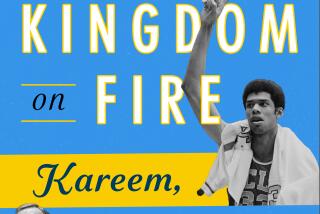John Wooden’s influence continued to grow even after coaching
In the days after John Wooden decided to leave basketball, walking away at the pinnacle of his career, he spoke of no big plans for the future.
UCLA had just won the 1975 national championship, the latest in a string of titles, and Wooden vowed never to coach again.
“I’d like to continue my daily, five-mile walk,” he said. “So I’m going to ask my boss if I can have a locker.”
Beyond that, Wooden suggested he might attend a few basketball camps in the summer. Nothing more.
No clue that sports were merely a prelude, that his legend would burn even brighter in the years to come, the public hungry for his brand of homespun wisdom.
No hint about the books he would write, the personal appearances and speaking engagements that would fill his calendar almost until his death on June 4.
“I’m going to try to keep busy, occupied,” he said. “And I hope I have enough things so I won’t go stale.”
Big man on campus
Life after March Madness began in a predictable way, in the place where Wooden had worked for 27 years.
Each new generation of students heard of him as a fable, then came to know him as an enduring presence on campus, where he attended games, sitting a few rows behind the bench, and sometimes addressed classes.
“It is extremely hard to find another individual who has made such an impact on the spirit of the UCLA campus,” Jasmine Hill, president of the undergraduate student body, said in a statement.
But it would be awhile before Wooden began to expand on his public image.
He was never much of a self-promoter and there came a period of time, after his wife, Nell, died in 1985, when he remained largely behind closed doors.
But his former players — especially those who went to the NBA — kept his name alive by lauding him in interviews, explaining that he had influenced their lives on and off the court.
It turned out they were setting the stage.
“I mean, you couldn’t hire better promoters than Kareem Abdul-Jabbar and Bill Walton,” said Brandon Steiner of Steiner Sports Marketing in New York. “You can’t get better advertising.”
When the former coach finally emerged from his funk, he found an audience waiting to hear him preach about such traditional values as industriousness, enthusiasm, poise and self-control. His “Pyramid of Success” — cynics had once smirked at its folksy insight — became all the rage.
Wooden began working with various co-writers, churning out one book after another, including volumes on basketball strategy and coaching, leadership and mentoring. There were children’s stories and a collection of favorite quotes too.
Wooden also found a forum for his teachings at corporate meetings and conventions.
Such work requires preparation and a knack for speaking to hundreds of people. Many sports personalities shy away, Steiner said.
In the early 1990s, the sports marketer hired Wooden to make a presentation to car executives.
“He was just so inspiring,” Steiner said. “So natural.”
The years did not dull this talent, Wooden remaining in demand well into his 90s.
“Never overdid it, no shtick, just good solid wisdom,” Steiner said. “A step above common sense — that’s how I describe him. He would say something and you said to yourself, ‘I should have thought of that.’ ”
Keep on going
It helped that Wooden never peddled himself, never shilled on television, keeping his image pure. It also might have helped that he was no longer coaching.
When he was at UCLA, some people suggested that he won so often because he had the best talent. Tim Floyd, the former USC coach now at Texas El Paso, said it was the same thing Lakers Coach Phil Jackson now faces.
“So they didn’t appreciate what a tremendous coach [Wooden] was,” Floyd said. “After coaching, people paid attention to what he had to say about not only basketball but about life.”
In the mid-’90s, former UCLA player Keith Erickson visited Wooden and noticed his calendar filled, sometimes two or three appointments a day. Erickson suggested he take life a little easier.
Wooden offered two reasons to keep pushing. First, he said, it gave him something to look forward to. Second, the former high school English teacher still felt an urge to inform and inspire.
“I want to be a better person,” he told Erickson, “better tomorrow than I am today.”
Another of his former players, Walton, isn’t the least bit surprised. Back in 1975, he had viewed Wooden’s retirement from a different angle.
“It did not signify an end to his lifelong commitment to teaching, merely a new beginning,” the Hall of Fame center said. “He was just getting started.”
twitter.com/LATimesWharton
Times staff writers Gary Klein, Diane Pucin and Chris Foster contributed to this report.
More to Read
Get our high school sports newsletter
Prep Rally is devoted to the SoCal high school sports experience, bringing you scores, stories and a behind-the-scenes look at what makes prep sports so popular.
You may occasionally receive promotional content from the Los Angeles Times.







